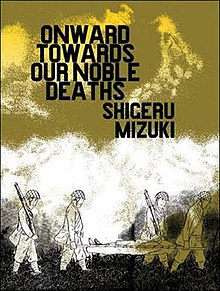Onward Towards Our Noble Deaths
| Onward Towards Our Noble Deaths | |

Cover of Onward Towards Our Noble Deaths as published by Drawn and Quarterly
|
|
|
総員玉砕せよ! (Sōin Gyokusai Seyo!) |
|
|---|---|
| Genre | War |
| Manga | |
| Written by | Shigeru Mizuki |
| Published by | Kodansha |
| English publisher | |
| Magazine | Shūkan Gendai |
| Published | 1973 |
| Volumes | 1 |
| Television drama | |
| Kitarō ga Mita Gyokusai: Mizuki Shigeru no Sensō | |
| Produced by | Tsuyoshi Yanagawa |
| Written by | Takuya Nishioka |
| Original network | NHK General TV |
| Original run | August 12, 2007 |
| Episodes | 1 |
Onward Towards Our Noble Deaths (Japanese: 総員玉砕せよ! Hepburn: Sōin Gyokusai Seyo!?, literally "Whole Unit Ought to Fight to Death!") is a one-shot manga written and illustrated by Shigeru Mizuki. In it, Mizuki describes his experiences as a soldier participating in the New Guinea campaign during World War II. He portrays the final weeks of his infantry service as the soldiers were instructed to die for their country to avoid the dishonor of survival.
The manga was first published in Kodansha magazine Shūkan Gendai in 1973, based on Mizuki's work of 1970. After being translated and published by Drawn and Quarterly in 2011, Onward Towards Our Noble Deaths has been well received by English-speaking critics. It also received awards in France and in the United States, and was adapted into a television drama in 2007 by Japanese broadcaster NHK.
Shigeru Mizuki is a Japanese manga artist who is best known for his yōkai (Japanese folklore monsters)-themed manga, especially GeGeGe no Kitarō. Mizuki enjoyed writing about the monsters' histories, which a local woman related to him; however in 1942, at the age of 21, Mizuki was drafted into the Imperial Japanese Army. He was sent to Rabaul, a city on New Britain island in Papua New Guinea, where his comrades died and Mizuki lost his left arm. Based on these experiences, Mizuki wrote Onward Towards Our Noble Deaths, containing "90 percent fact". Fictionalizing himself as private Maruyama, Mizuki tells the story by combining drawings with photographs.
...
Wikipedia
